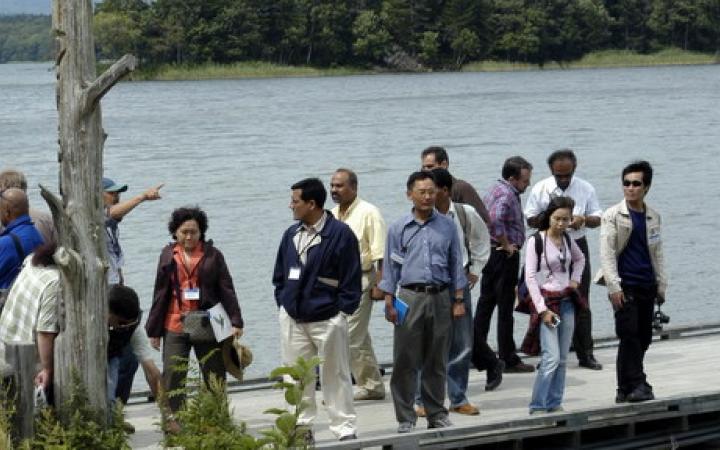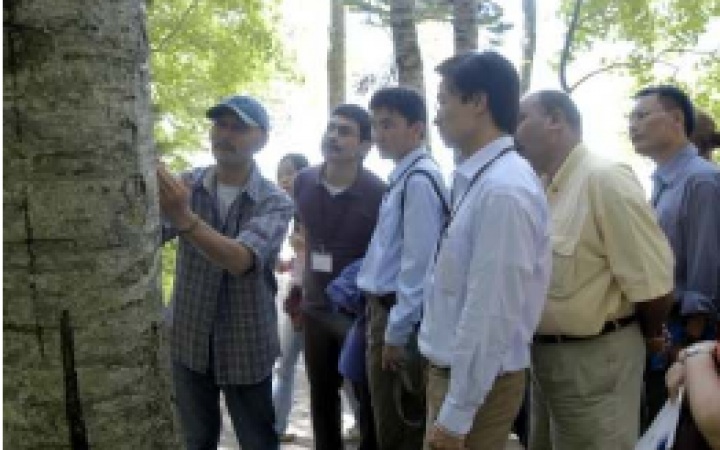The ecosystem approach as embraced in the Convention on Biological Diversity (CBD) points at the subtle relationship between conservation, sustainable use, and fair and equitable sharing of the benefits arising from genetic resources. It seeks to satisfy both ecological and human needs in the future, while its modality is comprehensive, integrated, and across time lapse. Though endorsed by many international conventions and decisions, and in spite of the continuous work to conceptualize it, the ecosystem approach needs further operational tools to be appropriately implemented.
In order to address these requirements, UNITAR Hiroshima and its Faculty developed the Training Series on Biodiversity with a three-dimensional approach:
- a focus on water resources and wetland management, to make best use of the workshop venue and the vital tool for ecosystem management--water
- a focus on socio-policy aspects and development of appropriate methodologies to enable participants to acquire applicable and ready-to-use knowledge
- utilization of lessons-learned and best practice approaches to enhance participants’ own thinking as to how best to apply the ecosystem tools to their own contexts
Launched in 1998 and having a large alumni network of over 200 experts, the series has gained reference and recognition in Asia and the Pacific. In its workshops, the series addressed pressing global questions including biodiversity and climate change.
Learning Objectives
Each training programme has its own specific theme focus. Generally, after completing a training programme participants will be able to:
- Outline methodology and tools for strategic project planning
- Describe the latest innovative approaches and lessons-learnt
- Illustrate ecosystem management approaches and principles
- Outline best practice for biodiversity management
- Discuss future challenges facing ecosystems
- Demonstrate effective ecosystem management techniques.
Methodology
The training programme is based on a blended-learning participatory approach and includes:
Interactive Lectures and Group Exercises
Interactive lectures are facilitated by key Resource Persons who examine the themes of the Workshop from a broad theoretical perspective down to case studies examining real world implementation. These presentations are augmented by small group exercises and frequent discussions from the floor, which serve to contextualise the issues being examined.
After-Action Reviews
Representing a key component of the Workshop, after-action reviews takes place within groups at the start of each morning, discussing the main issues raised in the previous presentations, as well as the specific frames of reference as applied to these by participants.
Study Tours
Underscoring the theoretical introductions and analysis presented, study tours form an integral part of the training methodologies utilised by UNITAR. Participants are able to relate to what has been seen and discussed in the training programme with actual examples of policy development and implementation.
Training the Trainer
A focus is made throughout the training sessions to relate the learning being facilitated to the realities on the ground. In addition, each participant is empowered to recreate the training upon their return to their organisation in order to achieve a self-propagating legacy of skills development.
Project Completion Reports
The UNITAR Hiroshima Biodiversity Training Programme has been successfully delivered on the following themes:
Training Workshop on Biodiversity and Climate Change, 29 June - 4 July 2008; Kushiro, Japan.
Mountain and Forest Ecosystems: Challenges, Issues and Ways Forward, 13-14 August 2007; Dehradun, India.
Training Workshop on Ecosystem, Water and Biodiversity, 27-31 August 2006; Kushiro, Japan.
Training Workshop on New Tools for the Ecosystem Management, 29 November - 3 December 2004; Kushiro, Japan.



